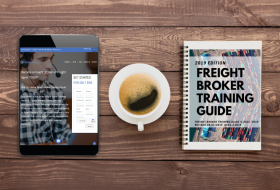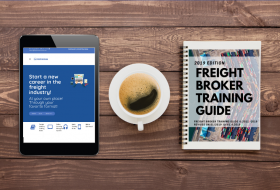Freight brokers need to find shippers in order to connect them with carriers and move freight. How do freight brokers find shipper is an age-old question and one new freight brokers need answers too. Here are seven ways how freight brokers find shippers.
For freight brokers to find shippers, it’s important to understand consumer products. Who manufactures them? Where do they come from? How many products do they sell? These are the sort of questions you need to target to know how freight brokers find shippers.
The Leads Surround You
Look around you, regardless of where you are the things you see were most likely freight hauled and delivered by trucks, after all, over 70 percent of all freight in America moves by truck. Furniture, office equipment, consumer electronics, clothes, they are all types of freight that shippers need to be hauled from one point to another. As a freight broker, you can find shippers by doing research on the products you see every day to find out where they are manufactured and how they are transported.
Review Your Purchase History and Compare
Drawing a blank or feeling helpless in finding shippers? Reviewing your own purchases can be a great starting place. Whether it’s the receipts from the store or your online Amazon order history, the products you purchase are manufactured and transported from somewhere.
As a freight broker looking to find shippers, you have to get creative at times and go beyond the normal trains of thought. Understand how companies are connected and if one lead doesn’t pan out or isn’t a viable option, don’t give up, there are seemingly endless possibilities.
Look at the Competition
Every product that is moved by freight has competitors, it’s a natural occurrence and a driving force of the capitalist economy. Take a large company like John Deere. They proudly manufacture varieties of tractors with manufacturing plants in Iowa, Wisconsin, and Georgia.
Despite being a Fortune 500 company and having a tremendous market share, John Deere has a lot of competition in the tractor industry. Using a tool like Morningstar Financial you can get insight into who’s its competitors are by clicking on the industry peers tab. Freight brokers can do this search for any publically traded company.
Cold Calling Shippers
Yes, cold calling is still alive and well. Once you find a shipper you will need to contact them in order to gauge their potential interest in using a freight broker. It’s easy to send a quick email but the chances of getting a response are quite low. The best way to connect with shippers is by calling them directly and be straight-forward in your dialogue.
A sales pitch isn’t necessary and can be off-putting, but you should describe who you work for, company background or achievements, where you’re looking to move freight through and see how you can be of assistance. Remember, you are there to provide them a service so it’s imperative that you listen to their needs and how you might be able to address their pain points.
You’ll need to understand how the shipper currently transports freight and see if there is an opportunity you can capitalize on. Undoubtedly, a significant portion of shippers will turn you down, but it’s a numbers game and you’ll never know if you have potential clients or not until you call.
Relationships, Trust and Load Boards
Finding shippers is only one aspect of the journey to be a successful freight broker. You’ll need to cultivate relationships and build a reputation for being dependable when servicing your shipping clients. To do this you will need to rely on load boards like Truckloads with over 100,000 qualified carriers that you can connect with to haul freight for the shipper.
15% OFF Packages above Basic.








